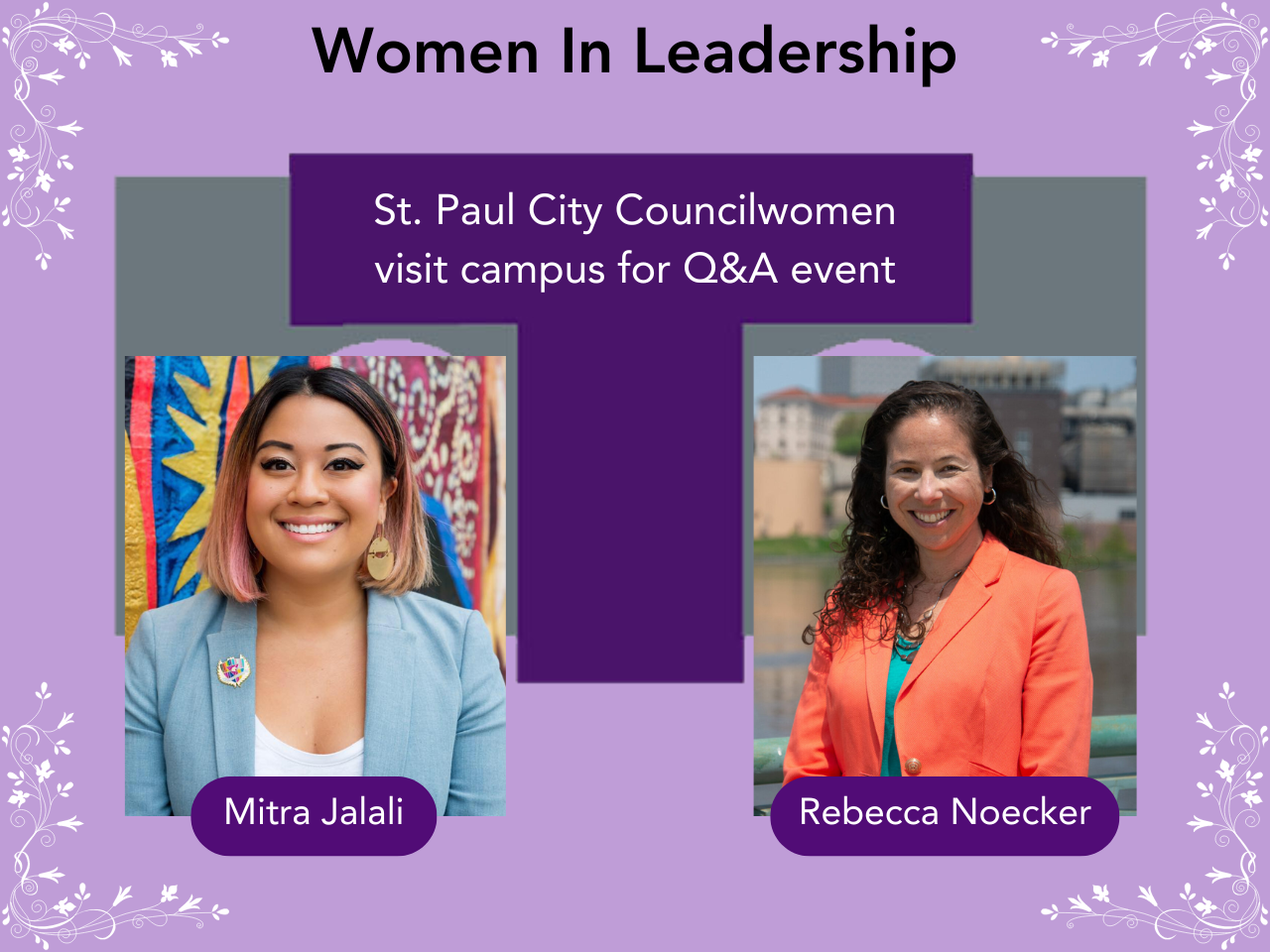
Two St. Paul City Councilwomen participated in a moderated question and answer event on Monday, hosted by St. Thomas organizations Students for Justice and Peace, Luann Dummer Center for Women, Feminist Community, Justice and Peace Studies, and the Civic Engagement, Voter Education & Advocacy Task Force.
Students and community members gathered at Scooters to hear from Mitra Jalali and Rebecca Noecker, members of St. Paul’s historic and groundbreaking all-female city council. This is the first council, for a city this size, to be led fully by women. In addition to the council being made up entirely of women, six of the seven representatives are women of color.
Mitra Jalali is the Council President and represents Ward 4, which includes the University of St. Thomas and other nearby colleges and the surrounding neighborhoods. Jalali was the first Iranian-American elected official in Minnesota.
Jalali discussed the start of her involvement in local government.
“I was a teacher, and I wanted to create a supportive environment for my students. Then I wanted to take it to a larger scale with the city of St. Paul,” Jalali said.
Rebecca Noecker was the first woman to represent Ward 2 and is the longest-serving member of the council.
“Everything around me was made up by people who make decisions about things. I remember realizing that if we don’t like that, we can make different decisions. I can be that person,” Noecker said.
The councilwomen discussed various topics, including their experiences with representation in local government, and what it’s like to represent underrepresented groups.
“It’s important to know who is present in asking for things. For example, there’s a difference in who you can reach with an online survey compared to asking questions with a clipboard somewhere in the community,” Jalali said.
Jalali also commented on barriers to running for office.
“You have to be able to afford it and have the time and resources. I think people’s attitudes are changing for the better, but what structurally can we change?” Jalali added.
Both women agreed that it is an honor to be a part of such a historic council, but negative comments can sometimes get in the way. “There are high expectations, and it’s our goal to live up to them,” Noecker said. “I want to be able to do the work that I’m here to do,” Jalali agreed.
Although there can be pushback, the councilwomen agree that this change is positive.
“There has been a huge energy shift in this council, and I think we’ve stepped up. We better represent who St. Paul is,” Jalali said.
The councilwomen also discussed how participation is crucial to local government, even in a city that represents about 45,000 people.
“While it’s a large and diverse population, you can still reach out to your representative and ask questions or raise concerns,” Noecker said. “Local participation matters more because of your impact. If you’re closer to the problem, you’re closer to the solution.”
The councilwomen also answered questions about how students can become more involved in local government.
“You can join your district council, contact local representatives about issues you care about, see who represents you – think about public policy when you’re experiencing an issue. You can make a change by reaching out and asking questions,” Jalali said.
Jalali emphasized how important young people are in making a difference.
“Never miss an election,” Jalali said.
This stood out to Rose Hissom, a first-year student at St. Thomas.
“Noecker said that somebody won by 36 votes in an election. That just shows how important it is to participate in any way you can. Voting is so important to make your voice known,” Hissom said.
“I think it’s really important that we have strong leaders in these positions who can look at every side of an issue and be able to defend their decisions as well, as opposed to making choices by blindly following others. It was impactful to hear from them,” Junior Alina Kiedinger added.
Junior Hannah Samuelsson also reflected on the discussion.
“I loved how (both speakers) truly felt like leaders. The way they answered the questions felt like they belonged in this position. It’s empowering to be reminded that females belong in positions of power and that this is how we should have been approaching society,” Samuelsson said.
Sabrina Thompson can be reached at thom4836@stthomas.edu.


